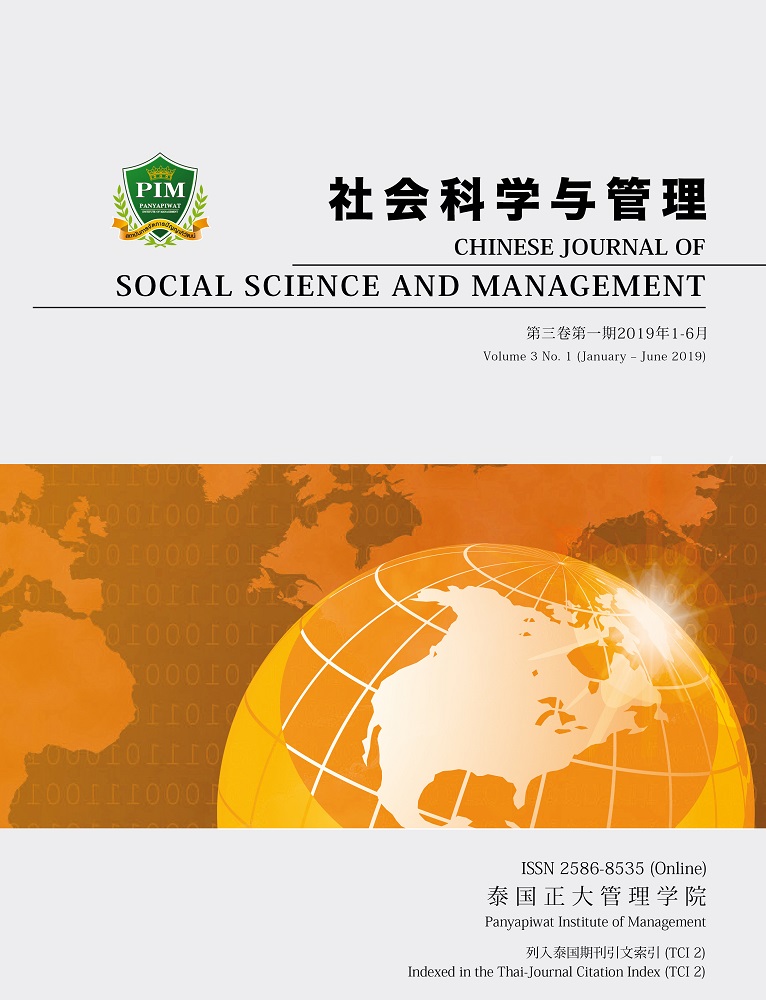RESEARCH ON THE INFLUENCE OF BOARD STRUCTURE TO THE INTERNAL CONTROL OF JOINT VENTURE COMPANIES: BASED ON THE MODERATING ROLE OF TOP MANAGEMENT POWER
Main Article Content
Abstract
As the core of corporate governance, the board of directors is an important factor influencing the level of internal control in joint ventures and it has great significance in the sustainable development of listed companies of Sino-foreign joint ventures. An empirical study of 148 Sino-foreign joint ventures in Shanghai and Shenzhen during the period from 2010 to 2015 was performed, and this paper studies
the moderating effect of senior executive power on the relationship between the board composition and internal control. The study reveals that the moderating mechanism of each agency indicators of the board composition on internal control via the use of the econometric model based on non-equilibrium panel data. By allowing for the possible biases caused by the conductor’s subjectivity in the implementation of internal control, and combining the multi-factors interaction and the joint ventures executive characteristics, three dimensions of the board composition including size, independence and the number of directors appointed by the parent company were selected. According to the research results, it can be found that the power of senior executives negatively moderates the relationship between the independence as one of the agency indicators of the board composition and the internal control. This result reflects that, as the moderator between the proportion of independent directors and internal control, the power of the senior executives in the joint venture has weakened the effect of independence on internal control. However, the moderating impact of executive power on the relationship between the other two agency indicators of the board composition, the size of the board of directors and the number of directors appointed by the parent company and internal control, are not significant.
Article Details
Chinese Journal of Social Science and Management Editorial Division
The Office of Research and Development, Panyapiwat Institute of Management
85/1 Moo 2, Chaengwattana Rd., Bang Talat, Pakkred, Nonthaburi 11120, Thailand
Tel. 02 855 01048 E-mail: cjssm@pim.ac.th
References
Bai C. E., Liu, Q., Lu, Z., Song, M. & Zhang, J. X. (2005). Chinese Listed Firms’ Corporate Governance. Economic Research Journal, 2(05), 81-91.
Beamish, P. W. (1993). The characteristics of joint ventures in the People’ s Republic of China. Journal of International marketing, 1(2), 29-48.
Birkinshaw, J., Hamel, G. & Mol, M. J. (2008). Management innovation. Academy of management Review, 33(4), 825-845.
Child, J. & Yan, Y. (1999). Investment and control in international joint ventures: the case of China. Journal of World Business, 34(1), 3-15.
Chong–En, B., Qiao, L., Joe, L. & Zhang, J. X. (2006). An empirical study on corporate governance and market valuation in China. Frontiers of Economics in China, 1(1), 83-111.
Dalton, D. R., Daily, C. M., Ellstrand, A. E. & Johnson, J. L. (1998). Meta-analytic reviews of board composition, leadership structure, and financial performance. Strategic Management Journal, 19(3), 269-290.
Fracassi, C. & Tate, G. (2012). External networking and internal firm governance. The Journal of finance, 67(1), 153-194.
Fredrickson, J. W., Hambrick, D. C. & Baumrin, S. (1988). A model of CEO dismissal. Academy of Management Review, 13(2), 255-270.
Geringer, J. M. & Hebert, L. (1991). Measuring performance of international joint ventures. Journal of international business studies, 22(2), 249-263.
Hambrick, D. C. & Finkelstein, S. (1987). Managerial discretion: A bridge between polar views of organizational outcomes. Research in organizational behavior, (9), 369-406.
Harrigan, K. R. (1988). Joint ventures and competitive strategy. Strategic management journal, 9(2), 141-158.
Hermalin, B. E. & Weisbach, M. S. (1998). Endogenously chosen boards of directors and their monitoring of the CEO. American Economic Review, 88(1), 96-118.
Jensen, M. C. (1993). The modern industrial revolution, exit, and the failure of internal control systems. The Journal of Finance, 48(3), 831-880.
Klein, K. J., Tosi, H. & Cannella, J. A. A. (1999). Multilevel theory building: Benefits, barriers, and new developments. Academy of Management review, 24(2), 248-253.
Laux, V. (2008). Board independence and CEO turnover. Journal of Accounting Research, 46(1), 137-171.
Li, G. F. (2013). A Study on the Relationships among Joint Ventures’ Control and Performance — Based on Analysis of Chinese Mass Customization Industry. Doctoral dissertation. Suzhou University.
Li, J. Z. & Xu, X. M. (2008). Research on the Intervening Mechanism between CEO Tenure and Corporate Performance. Soft Science, 22(12), 60-66.
Minichilli, A. & Hansen, C. (2007). The board advisory tasks in small firms and the event of crises. Journal of management & governance, 11(1), 5-22.
Pfeffer, J. & Salancik, G. R. (1978). The External Control of Organizations: A Resource Dependence Perspective. New York: Harper and Row.
Quan, X. F. & Wu, S. N. (2010). CEO Power, Information Disclosure Quality and Corporate Performance Variability: Empirical Evidence from the Listed Companies in SZSE. Nankai Business Review, 4, 142-153.
Schaan, J. L. F. (1983). Parent control and joint venture success: The case of Mexico. Doctoral Thesis. Western University.
Tretiak, L. D. & Holzmann, K. (1993). Operating joint ventures in China. Hong Kong: 30 Economic Intelligence Unit.
Zahra, S. A. & Pearce, J. A. (1989). Boards of directors and corporate financial performance: A review and integrative model. Journal of management, 15(2), 291-334.
Zald, M. N. (1969). The power and functions of boards of directors: A theoretical synthesis. American journal of Sociology, 75(1), 97-111.
Zhao, X. & Zhang, X. S. (2013). Internal Control, Managerial Power and M & A Performance: Evidence from the Chinese Securities Market. Nankai Business Review, 16(2), 75-81.
Zhou, J., Li, X. Q. & Yang, S. (2015). Board Tasked-Related Fault lines, Effort Level and Firm Value. Chinese Journal of Management, 12(1), 44.


